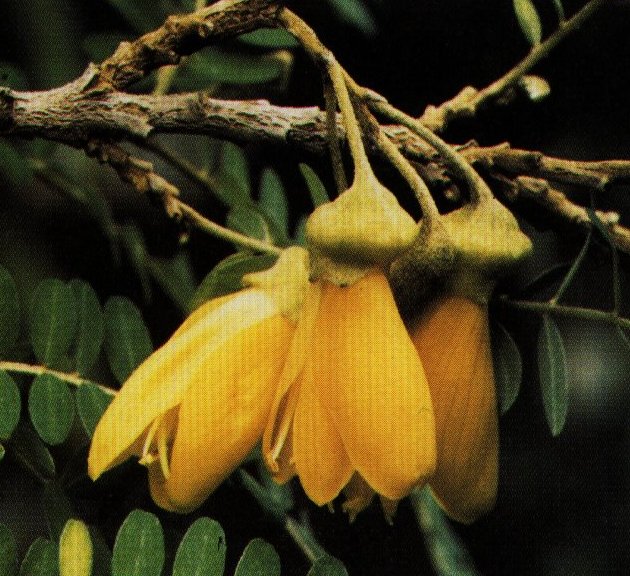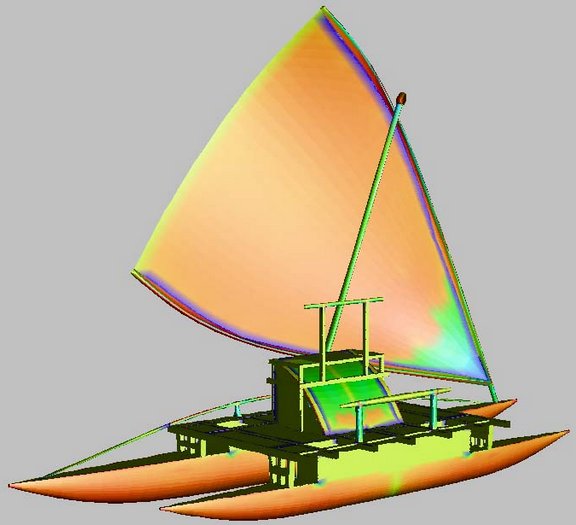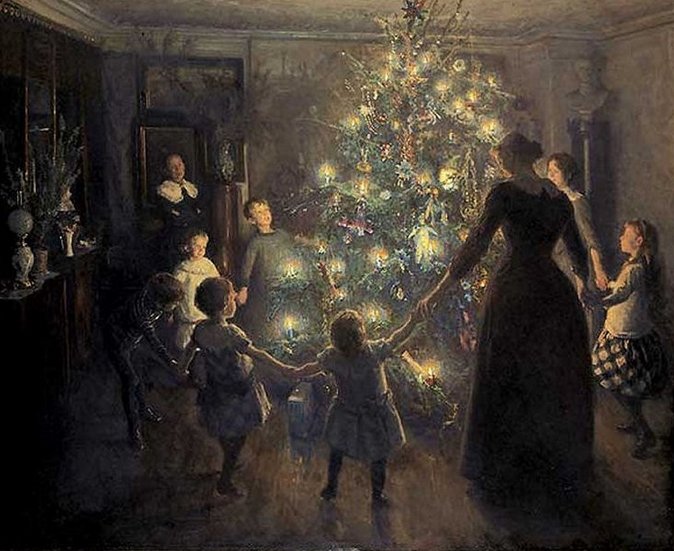Closely beyond 'making a king' (haka-ariki) we should not be surprised to find the statement that Toro-miro was a King (Tupu). My translation of Tupu as 'King' follows from the Cardinal letter supplied by Metoro together with the Polynesian dialect on Samoa.
Tupu. 1. Shoot, sprout, bud; to sprout, to bud. 2. Pregnant: vî'e tupu (o te poki); to be conceived (of fetus in its mother's womb): he-tupu te poki i roto i te kopú o toona matu'a. Vanaga. To grow, to sprout, to germinate, to come forth, to conceive, pregnant, germ; mea tupu, plant; tupu ke avai, of rapid growth; tupu horahorau, precocious; hakatupu, to produce, to stimulate growth, to excite. P Pau.: fakatupu, to raise up, to create. Mgv.: tupu, to grow, to conceive, to be pregnant. Mq.: tupu, to grow, to sprout, to conceive. Ta.: tupu, to grow, to sprout. Churchill. Mgv.: Tupu, the best or worst, used of men or of bad qualities. Sa.: tupu, king. Ma.: tupu, social position, dignity. Churchill. When the Tree was in full bloom (pregnant, tupu) - fully dressed - this was synchronized by how the King also should be dressed up in the same fashion: ... What I saw stunned me, for in her hand lay a perfect replica of the earflares worn by the Classic Maya kings. Suddenly I understood the full symbolism of so many of the things I had been studying for years. The kings dressed themselves as the Wakah-Chan tree, although at the time I didn't know it was also the Milky Way. The tzuk [partition] head on the trunk of the tree covered their loins. The branches with their white flowers bent down along their thighs, the double-headed ecliptic snake rested in their arms, and the great bird Itzam-Yeh stood on their head. I already knew as I stood under the young tree in Tikal that the kings were the human embodiment of the ceiba as the central axis of the world. As I stood there gazing at the flowers in Joyce's hand, I also learned that the kings embodied the ceiba at the moment it flowers to yield the sak-nik-nal, the 'white flowers', that are the souls of human beings. As the trees flowers to reproduce itself, so the kings flowered to reproduce the world ... ... Up to the present time, fertility spells for fowls have played an important role. Especially effective were the so-called 'chicken skulls' (puoko moa) - that is, the skulls of dead chiefs, often marked by incisions, that were considered a source of mana. Their task is explained as follows: 'The skulls of the chiefs are for the chicken, so that thousands may be born' (te puoko ariki mo te moa, mo topa o te piere) ... As long as the source of mana is kept in the house, the hens are impregnated (he rei te moa i te uha), they lay eggs (he ne'ine'i te uha i te mamari), and the chicks are hatched (he topa te maanga). After a period of time, the beneficial skull has to be removed, because otherwise the hens become exhausted from laying eggs ... ... His wife sang a dirge of lament, but did precisely as she was told, and in the morning she found her house surrounded by a perfect thicket of vegetation. 'Before the door,' we are told in Thomas Thrum's rendition of the legend, 'on the very spot where she had buried her husband's heart, there grew a stately tree covered over with broad, green leaves dripping with dew and shining in the early sunlight, while on the grass lay the ripe, round fruit, where it had fallen from the branches above. And this tree she called Ulu (breadfruit) in honor of her husband ... The King impersonated the World Tree among the Mayas and reasonably it could be expected to find the Easter Islanders making the same kind of correlation between their King and the Toromiro Tree.
And surely the King would have had supporters dressing him up in the proper attire (haka-ariki) at the proper time - making him into a King Tree in full bloom.
Ariki. 1. King, ruler, member of the nobility, Ariki henua, king; members of the royal family, descending from Hotu Matu'a; noble, nobility, chief. 2. Divine being, superior being. Ariki Paka, certain collateral descendents of Hotu Matu'a, who exercised religious functions. Vanaga. Chief, king, lord, headman in general. Hakaariki, to make one a king. P Pau., Mgv.: ariki, chief. Mq.: aiki, id. Ta.: arii, id. The Marquesan use both aiki and hakaiki in the same sense; the latter forms with Mangarevan akariki a subordinate couple in Southeast Polynesia. Since akariki is the only form in Mangareva and the Marquesas have both we may regard this as indicative of the influence of Mangareva upon the Marquesas. In Tonga we find only eiki; the vowel change is quite in the Tongan manner, the dropping of the liquid is most unusual; the eiki form appears once more in Mangarevan ataeiki (also a language in which it is unusual to drop the liquid) in the sense 'to do nothing and to dress richly in a luxurious way'. Churchill. ALII, s. Haw., a euph., a king, a chief. Rarot., Paum., ariki, id. Fakaafo, aliki, id. Mangar. akariki, id. Tong., eiki, id. Marqu., aiki, hakaiki, id. N. Zeal., ariki, chief and high-priest. Tah., arii, chief. Sam., alii, chief. Sanskr., rij (for primitive Vedic râj, to govern, Benfey), to stand or be firm, be strong; râj, râjan, king. Goth., reiki, dominion; reiks, king, chief. Sax., rik, noble; rici, dominion, state. Icel., rikr, in compounds as ul-rikr, e-rikr. Swed., rik, rich; riki, kingdom. Irish, righ, king; airigh, chief. Welsh, -rix, a frequent suffix in the names of nobles. Zend, raĝi, kingdom (A. Pictet). Lat., rex, king; rego, rectus. Fornander.
And we should notice that also the Toromiro was dwelling (noho) down in the waters (like the Maize God when he was being dressed up) - viz. in the neverending supply of sweet water down in the volcanic crater lake Rano Kau. Trees do not move and neither should the kings - they 'should do nothing' and 'dress richly in a luxurious way'. Noho. 1. To sit, to stay, to remain, to live (somewhere), to wait; ka-noho, you stay! (i.e. 'good-bye', said by the person leaving). 2. Figuratively: he noho te eve, to be calm, at peace; he noho te mana'u, to concentrate on something, to fix one's attention on; ku-noho á te mana'u o te tagata ki ruga ki te aga, the man thinks constantly of his work. Vanaga. Seat, bench, dwelling, marriage, position, posture, situation, session, sojourn; to sit, to dwell, to reside, to rest, to halt, to inhabit; noho hahatu, to sit cross-legged; noho hakahaga, apathy; noho heenua, countryman; noho kaiga, native; noho kenu, married; noho ke noho ke, to change place; noho muri, to stay behind; noho noa, invariable; noho opata, to stand on a cliff; noho pagaha, badly placed; noho pepe, table; noho tahaga, bachelor, unmarried; noho vie, married, noho no, apathy, stay-at-home, colonist, idler, inhabitant, inactive, immobile, settler, lazy, loiterer. Hakanoho, to abolish, to rent, to lease, to enslave, to dissuade, to exclude, to exempt, to install, to substitute, hostage. Hakanohohia, stopped. Nohoga, seat. Nohoturi, to kneel, genuflexion. Nohovaega, to preside. Churchill. All beings needed fresh sweet water (in addition to air) in order to live on - vai ora.
Ola, life, health, well-being, living, livelihood, means of support, salvation; alive, living; curable, spared, recovered, healed; to live; to spare, save, heal, grant life, survive, thrive. Ola loa, long life, longevity, Ola 'ana, life, existence. Wehewehe. Ora. 1. Healthy; to recover, to be saved (from an illness or a danger): ku-ora-á, ina kai mate, he recovered, he did not die; ku-ora-á te haoa, the wound has healed; e-ora-no-á, he is still alive; ora-hakaou mai, to come back to life; ora ké, what a pleasant breeze! (lit: how healthy!). 2. Stick for spinning top (made from the shell of a sandalwood nut) with which children make the top spin. Vanaga. 1. December, January. Ora nui, November, October. 2. To live, to exist, to draw breath, to survive, to subsist, to be well, healthy, safe, to refresh, a pause, rest, ease; e ko ora, incurable; ora tuhai, previous existence; ora iho, to resuscitate, to revive; ora nui, vigorous; oraga, life, existence; oraga roaroa, oraga roaroa ke, oraga ina kai mou, immortality; oraga kore, lifeless; oraga mau, oraga ihoiho, vivacious; oraora, oraora no iti, to be better; hakaora, to draw breath, to revive, to strengthen, healthy, to sanctify, to animate, to save, to repose, to cure, to rest, to comfort, to assuage; hakaora ina kai mou, to immortalize; hakaoratagata, Messiah, Saviour. 3. To give water to; kua ora te kevare, to water a horse; hakaunu ora, to water. 4. To staunch, to stop the flow of a liquid. 5. To make an escape; hakaora, to discharge, to deliver, to set free. 6. To be awake (probably ara); hakaora to guard. 7. A zephyr, light wind; kona ora, a breezy spot; ahau ora, agreeable breeze. Churchill. The explorers reach Easter Island in a 'canoe' (vaka). The name of their craft is given as Oraorangaru 'saved from the billows' (Brown 1924:40) or Te Oraora-miro 'the living-wood' (ME:58). The Routledge reference 'Each (man went) on a piece of wood' (RM:278) also seems to refer to the name of the canoe. As far back as 1934, the name was no longer understood. I favor the following explanation: The difficulty in interpreting the name of the canoe of the explorers arises from the name segment oraora. To begin with, the compound form oraora ngaru should be analyzed in comparison with other Polynesian compounds, such as MAO. pare-ngaru 'that which fends off the waves' (i.e., the hull of the boat), TAH. tere-'aru 'that which moves through the waves' (i.e., riding the waves on a board). There are several possible translations for oraora as the reduplication of ora. Te Oraora Miro can be translated as 'the pieces of wood, tightly lashed together' (compare TAH. oraora 'to set close together, to fit parts of a canoe') and be taken to refer to the method of construction of the explorer canoe, while Oraora Ngaru means 'that which parts the water like a wedge', or 'that which saves (one) from the waves, that which is stronger than the waves'. (Barthel 2) The month names Ora and Ora Nui do not appear in the list we have used so far: 1. Month, light. The ancient names of the month were: Tua haro, Tehetu'upú, Tarahao, Vaitu nui, Vaitu poru [potu?], He Maro, He Anakena, Hora iti, Hora nui, Tagaroa uri, Ko Ruti, Ko Koró. 2. Name of an ancient tribe. Maramara, ember. Vanaga. Instead they were double-months:
Out at sea a pair of twin hulls were necessary in order to keep the stability.
... At Opoa, at one of the last great gatherings of the Hau-pahu-nui, for idolatrous worship, before the arrival of European ships, a strange thing happened during our [the two priests of Porapora, Auna-iti and Vai-au] solemn festivity. Just at the close of the pa'i-atua ceremony, there came a whirlwind which plucked off the head of a tall spreading tamanu tree, named Paruru-mata'i-i-'a'ana (Screen-from-wind-of-aggravating-crime), leaving the bare trunk standing. This was very remarkable, as tamanu wood is very hard and close-grained. Awe struck the hearts of all present. The representatives of each people looked at those of the other in silence for some time, until at last a priest of Opoa named Vaità (Smitten-water) exclaimed, - E homa, eaha ta 'outou e feruri nei? (Friends, upon what are you meditating?) - Te feruri nei i te tapa'o o teie ra'au i motu nei; a'ita te ra'au nei i motu mai te po au'iu'i mai. (We are wondering what the breaking of this tree may be ominous of; such a thing has not happened to our trees from the remotest age), the people replied. Then Vaità, feeling inspired, proceeded to tell the meaning of this strange event… I see before me the meaning of this strange event! There are coming the glorious children of the Trunk (God), who will see these trees here, in Taputapuatea. In person, they differ from us, yet they are the same as we, from the Trunk, and they will possess this land. There will be an end to our present customs, and the sacred birds of sea and land will come to mourn over what this tree that is severed teaches. This unexpected speech amazed the people and sages, and we enquired where such people were to be found. Te haere mai nei na ni'a i te ho'e pahi ama 'ore. (They are coming on a ship without an outrigger), was Vaitàs reply. Then in order to illustrate the subject, Vaità, seeing a large umete (wooden trough) at hand, asked the king to send some men with it and place it balanced with stones in the sea, which was quickly done, and there the umete sat upon the waves with no signs of upsetting amid the applauding shouts of the people ... The circling wind (whirlwind) took off the head of the great tree. This circular movement of the wind was evidently synchronized in how also people were at first dancing around and then stripping their tree at Christmas (when high summer was at the Full Moon). ... In other words, the ancient Druidic religion based on the oak-cult will be swept away by Christianity and the door - the god Llyr - will languish forgotten in the Castle of Arianrhod, the Corona Borealis. This helps us to understand the relationship at Rome of Janus and the White Goddess Cardea who is ... the Goddess of Hinges who came to Rome from Alba Longa. She was the hinge on which the year swung - the ancient Latin, not the Etruscan year - and her importance as such is recorded in the Latin adjective cardinalis - as we say in English 'of cardinal importance - which was also applied to the four main winds; for winds were considered as under the sole direction of the Great Goddess until Classical times ...
|
||||||||||||||||||||||||||||||||||||||||||||||||||||||||||||||||||||||||||||||||||||


.jpg)




